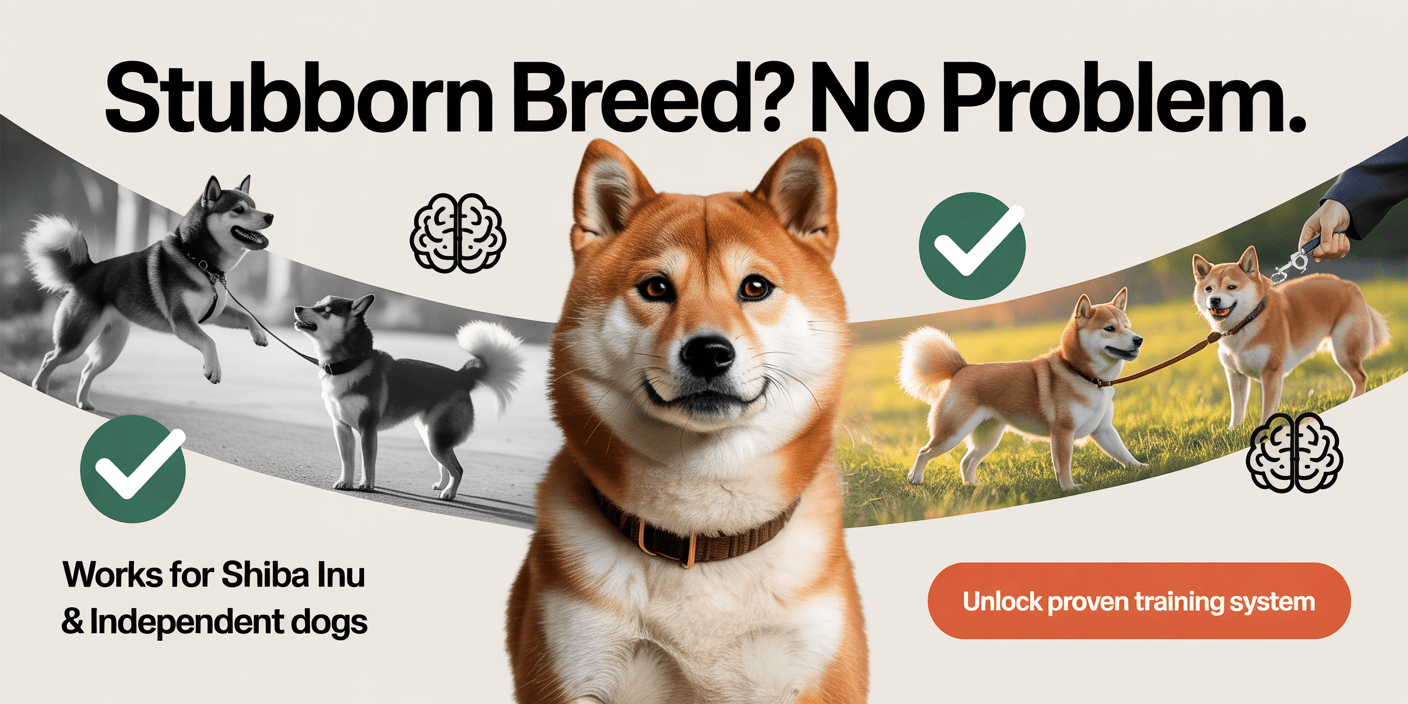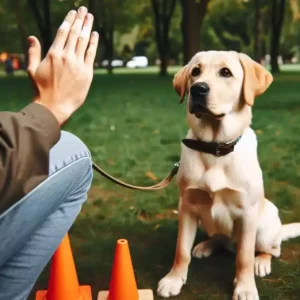Can a Shiba Inu be a service dog? While their independent nature poses challenges, this intelligent breed can excel as psychiatric alert, medical response, or mobility assistance dogs with proper training. Discover how Shiba Inu as service dogs defy stereotypes through specialised brain training that channels their focus into life-changing tasks for handlers.
Did you know Shiba Inus, known for their independent streak, can be trained as service dogs? Over 30% of Shiba Inu owners say their dogs are great at tasks like navigating stairs and avoiding obstacles. Buttons, for example, help Lizik with these tasks.
These small dogs are loyal and alert. But their stubbornness can make training tough. They can help with mobility and manage crowds calmly. But early socialisation and patience are key to their success.
Real examples like Mira and Chiyo, trained by Pawsitive Action Foundation and Canine Connection, show it’s possible. But what does it take to turn their natural traits into reliable service work?
Key Takeaways
- Shiba Inus have traits like intelligence and alertness vital for service dog roles.
- Successful training requires patience and tailored methods, as seen in Buttons’ and Mira’s cases.
- Public reactions range from curiosity to scepticism due to breed stereotypes.
- Early socialisation and persistence overcome their independent nature.
- Shiba Inus can meet strict service dog standards when properly trained.
Understanding the Shiba Inu Breed
The Shiba Inu is a unique service dog breed. They come from ancient Japan, bred for hunting small game. This history made them alert and agile. Their size and coat are perfect for different climates, thanks to their mountainous origins.
Breed History
Shibas have been in Japan for over 3,000 years. They were great at tracking and flushing prey. Even today, they are agile and independent. The AKC recognised them in 1993, but their hunting roots are still important.
Physical Traits
- Height: 13–17 inches at the shoulder
- Weight: 17–23 pounds, compact and muscular build
- Coat: Red, black & tan, or sesame colors with a signature “urajiro” undercoat
Behavioral Characteristics
Shiba Inus need mental challenges and 1–2 hours of exercise daily. They are loyal but also strong-willed. Positive training is best, as they are sensitive. Early socialisation helps them be less shy around strangers.
They are smart but can be stubborn. Over 60% of owners use creative rewards to train them. Knowing their nature is crucial for service work.
Evaluating Shiba Inu Temperament for Service Dog Work
Shiba Inus are smart and loyal, making them great for service work. They are alert and bond strongly with their owners, helping them follow commands. But they can be stubborn and need special Shiba Inu training methods.
Being consistent is crucial. Early socialisation and constant effort help manage their stubbornness.
- Alertness and loyalty: assets for task performance
- Independent nature: challenges traditional training approaches
- High energy levels: demand regular mental and physical stimulation
| Trait | Pros | Cons |
|---|---|---|
| Alertness | Quick to detect changes in environment | Potential overreactivity |
| Independence | Problem-solving ability | Resistance to repetitive commands |
| Energetic | Capable of active tasks | Requires more exercise time |
“Positive reinforcement works best with Shibas due to their sensitivity and pride.”
Shiba Inus do well with training that uses rewards. Their hunting instincts and agility are great for tasks like fetching or alerting. But they can get anxious, so they need careful handling, even more in new places.
Early socialisation helps them feel less scared, making them reliable service dogs. Owners need to be firm but patient to bring out their best in service roles.
Knowing these traits helps decide if Shiba Inu training fits your goals. Their special nature needs a thoughtful approach, but can lead to great results for committed handlers.
Shiba Inu as Service Dog: Suitability and Challenges

Shiba Inus can do great in service roles, but they need careful thought. Knowing their good points and bad helps figure out if they’re right for you. The therapy shiba inu role shows they can be very helpful in supportive places.
Pros and Cons
These dogs do well in places with rules because they’re smart and alert. They’re very loyal, which makes them good friends. But, they can be hard to train because they like to do things their own way. They also shed a lot and can get anxious sometimes.
Common Challenges
- They can be stubborn, so you need to train them every day to keep them focused.
- If you don’t socialise them early, they might act weird in public.
- They need lots of things to do to keep them from getting bored and restless.
Handlers say Shiba Inus need a lot of patience but give a lot of loyalty, a trainer notes. Their fit for therapy shiba inu roles depends on the right training.
Even though they’re protective, it’s hard to balance their traits. Good training can turn their lively nature into a plus for service work.
Training Essentials for Your Shiba Inu Service Dog
Start training your Shiba Inu between 8 and 12 weeks old. This is the best time for them to learn important behaviours. It’s important to be consistent. Use the same commands and rewards every time to avoid confusion.
Positive reinforcement, like treats or praise, helps build good habits. Keep training sessions short, 10–15 minutes, to keep your dog focused.
- Use simple one-word commands like “sit” or “stay” to simplify learning.
- Introduce public settings gradually to build confidence and reduce anxiety.
- Redirect unwanted actions with alternatives like chew toys instead of punishment.
“Consistency transforms potential into reliability. A well-trained Shiba Inu can master complex tasks when training aligns with their unique temperament.”
Online courses like SpiritDog’s Ultimate Puppy Bundle offer 70+ video lessons on potty training and biting management. The K9 Training Institute’s Dog Masterclass provides step-by-step solutions for behavioural challenges. Use these resources with daily practice to reinforce commands and build trust. Be patient with your dog’s pace—patience leads to long-term success.
Special Considerations: Shiba Inu Service Dog Tasks and Roles

Shiba Inu service dogs are trained for specific tasks. They can help with things like getting medication, warning of dangers, or stopping self-harm. Their small size and alertness make them great for tight spaces, like during medical emergencies.
My Shiba Inu, Kai, alerts me to panic attacks by nudging my hand and bringing my phone. This task has been life-changing for managing my anxiety episodes.
- Medical alerts: They can detect changes in blood sugar or sense seizures coming.
- Distraction tasks: They can be distracted during PTSD or obsessive behaviours.
- Public assistance: They help calm handlers in crowded places with steady contact.
Each dog’s tasks depend on their handler’s needs. For example, a dog might learn to:
- Get emergency contact cards.
- Press touchpads to activate alarms.
- Lead handlers to safe areas during anxiety.
Training takes 120 hours over six months, with 30 hours in public. It’s important to be consistent to build focus for important tasks. Shiba Inus do well when tasks match their natural behaviours, like alert barking or focused retrieval.
Navigating Service Dog Regulations in the United States
The Americans with Disabilities Act (ADA) says service dogs are animals trained for people with disabilities. If you have a Shiba Inu, following these rules is key. Your dog must be trained to help with your disability, like alerting you to health issues or getting things for you.
- Only dogs qualify as service animals under ADA guidelines
- Public access rights apply to all businesses, including restaurants and housing
- Training must focus on task-specific behaviours like calming during anxiety or noise alerts
Courses like Pettable Academy’s psychiatric service dog training offer a clear path. Even though you don’t need a certificate everywhere, having one can help. Always check your state’s laws, as some might need more paperwork or a formal certificate.
Businesses can only ask two things: if your dog is a service animal and what it does. Emotional support claims without specific training don’t count under ADA. Service dogs need to stay calm and ignore distractions in public.
Exploring Therapy and Emotional Support with Shiba Inus

Shiba Inus are great at therapy work. They offer comfort with their calm and intuitive nature. Unlike service dogs, therapy dogs like Shiba Inus provide emotional support in places like hospitals or schools. Their soft fur and calm behaviour make them perfect for touch interactions.
“Shiba Inus have a life expectancy of 15.5 years, allowing long-term therapy partnerships,” says research. Their sensitivity to stimuli must be managed well. This is because it can lead to aggression.
Understanding Therapy Roles
Therapy Shiba Inus work in various settings, like disaster zones or courtrooms. Karen Jones’ Shiba Inus, including Dennis, have comforted police officers and victims in stressful situations. Their playful yet calm nature helps lower anxiety during visits.
ESA vs. Service Dog
| Category | Emotional Support Animal | Service Dog |
|---|---|---|
| Purpose | Provide emotional comfort | Perform trained tasks |
| Legal Rights | Limited public access rights | Public access allowed |
| Training | No formal certification required | Extensive task-specific training |
Incorporating Shiba Inus in Therapy
- Exposing puppies to diverse environments to reduce reactivity
- Focus on socialisation to enhance their innate empathy18
- Track progress through temperament assessments during training
While their independence needs patience, their emotional sense makes them valuable therapy companions. Proper training can unlock their potential as comforting allies without compromising public safety.
The Importance of Certification for Shiba Inu Service Dogs
Getting your Shiba Inu service dog certified is key to showing they’re ready for public work. Programs like Professional Assistance Dogs (PAF) check their obedience and how they do in public.
Certification meets the Americans with Disabilities Act (ADA) rules. It shows your dog can do tasks despite a disability. In California, it also lets them go into public places. Without it, you might face doubts from others.
- Obedience training to handle distractions
- Task-specific training for disability-related needs
- Public access testing in busy environments
To get certified, you need to show your dog can do specific tasks and have medical proof. Groups like PAF check if your Shiba Inu can do 3–5 tasks that help you. These tasks could be alerting you to anxiety or getting your medicine.
With certification, you have legal rights to be in public places. It also protects you from being treated unfairly, thanks to laws. Having the right papers, like a medical letter and certification, proves your rights.
Expert Tips for Shiba Inu Training and Handling

“Positive reinforcement builds stronger bonds and better results with Shibas.” – Professional trainers
Effective training starts with proven techniques. Use passive resistance by ignoring unwanted behaviour until your Shiba Inu chooses to act calmly. Reward good behaviour with treats or praise. The Nothing in Life is Free (NILIF) program teaches commands-response routines, like requiring a “sit” before meals. Pair this with positive reinforcement methods—treats, praise, or play—to reinforce desired actions.
Consistency and Patience
- Stick to the same commands, routines, and consequences daily.
- Adjust training sessions to your Shiba’s attention span (5–10 minutes for puppies).
- Use a drag lead during walks to guide without force.
Building Trust
Socialise your Shiba early to people, pets, and environments to reduce fear-based aggression. Grooming sessions should be short and paired with treats to build comfort. When resource guarding occurs, teach “drop it” commands with gradual rewards. Stay calm—Shiba Inus sense human stress and may react. Professional programs like Royvon’s structured training offer extra support.
Connecting with Shiba Inu Service Dog Organizations
Shiba Inu service dog organisations offer crucial support for those wanting to train or partner with these special dogs. Groups like Pawsitive Action Foundation (PAF) and Canine Connection tailor training to fit Shiba Inu’s unique needs. They break commands into simple steps, like “wait” and “stay”. These groups help owners deal with the breed’s independent nature, ensuring reliable service.
- Research certified trainers who focus on Shiba Inu-specific needs
- Contact organisations like PAF to learn about training protocols and certification processes
- Join online communities to share experiences and access resources
“Mira’s training with PAF showed Shibas can excel with tailored methods,” says a handler whose Shiba was certified for emotional support tasks.
These organisations also guide owners through the certification process. For example, American Service Pets offers certification for emotional support and psychiatric service roles. Look for groups that focus on socialisation and patience, essential for overcoming Shibas’ stubbornness. By working with these networks, you get trainers who know the breed’s intelligence and loyalty, vital for service work.
Begin by visiting websites like PAF or Canine Connection to check out their programs. Ask about their training approach and success stories. Building these connections ensures your Shiba gets the specialised care needed to excel in a service role.
Understanding Shiba Inu as an Emotional Support Animal (ESA)
Thinking about getting a shiba inu esa? ESAs offer comfort for mental health issues, but are not the same as service dogs. You need a letter from a licensed mental health professional to qualify. This part explains how to get certified and the legal differences.
ESA Certification Process
- Get a prescription letter from a licensed therapist or psychiatrist.
- Register your Shiba Inu with an ESA registry (optional but recommended for documentation).
- Make sure your dog’s personality fits the ESA role, using their alertness and loyalty.
Differences Between ESA and Service Dog
| ESA | Service Dog |
|---|---|
| No formal training required | Extensive task-specific training mandatory |
| Covers emotional comfort | Performs disability-related tasks (e.g., panic prevention) |
| No public access rights | ADA grants access to most public spaces |
“Misrepresenting pets as ESAs undermines legitimate cases and risks legal penalties”.
Shiba Inus are independent and need patient training for ESA roles. They are great at being calm companions, but must follow ESA rules. Always check if your housing allows ESA accommodations under the Fair Housing Act.
Transform Your Shiba Inu into an Exceptional Service Dog!
Struggling with your Shiba’s stubborn streak or focus issues? Adrienne Farricelli’s CPDT-KA certified Brain Training for Dogs program unlocks your dog’s hidden intelligence—making service training easier and more effective!
Why This Works for Shiba Inus:
✅ Breed-Specific Solutions – Tailored games to channel their independence into focus and obedience.
✅ Science-Backed Methods – Uses neuroplasticity to rewire your dog’s brain for better behaviour.
✅ Eliminates Problem Behaviours – Stops barking, chewing, or ignoring commands that derail training.
✅ 21 Engaging Brain Games – Perfect for sharpening impulse control (critical for service work!).
✅ 60-Day Guarantee – Try it risk-free or get your money back.
🐕🦺 Unlock Your Shiba’s Service Potential TODAY!
👉 Click Here to Start Training NOW! 👈
Bonus: FREE Behaviour Training for Dogs guide (value $67) with purchase!
Conclusion
Shiba Inus can become great service dogs with the right training and certification. They need to learn obedience, behave well in public, and master specific tasks. Training can take at least 18 months, but only half of service dogs get certified.
This journey requires a lot of effort and patience. It’s not easy, but it’s worth it.
Having enough money and following the law are also important. Groups like PAF and Canine Connection show Shibas can help with PTSD. They can even detect malware through scent, as BYDFi does.
Owners must keep up with certification and training. Stories of dogs like RW’s Mira and CH’s Chiyo show Shibas can excel with the right approach. Before starting, think about your dog’s personality, time, and resources to see if they fit the service dog role.
FAQ
Can a Shiba Inu be trained as a service dog?
Yes, Shiba Inus can be trained as service dogs. But they have unique challenges. Their independent nature and strong-willed temperament can make training harder.
What are the characteristics of Shiba Inus that make them suitable for service work?
Shiba Inus are loyal, alert, and very intelligent. These traits are good for service tasks. But their independence means they need more consistent training.
What kind of training do Shiba Inus need to become effective service dogs?
They need basic obedience, socialisation, and task training. Early and consistent training is key to success.
What are some common challenges in training a Shiba Inu as a service dog?
Training challenges include their stubbornness and socialisation issues. They may also have problems during adolescence. Specialised training can help address these challenges.
How do Shiba Inus compare to other service dog breeds?
Shiba Inus can be good service dogs, but they’re not as easy to train as breeds like Labradors or Golden Retrievers. This is because of their independent nature.
What specific tasks can a Shiba Inu service dog perform?
They can alert to sounds, remind owners to take medication, or provide comfort during anxiety. Their training determines their tasks.
What is the difference between a service dog and an emotional support animal (ESA)?
Service dogs are trained for specific tasks for people with disabilities. ESAs provide comfort but don’t have the same legal rights as service dogs.
What certification is needed for a Shiba Inu to be recognised as a service dog?
There’s no federal law requiring certification. But getting documentation from a reputable service dog organisation can help in public settings.
How can I find reputable organisations for Shiba Inu service dog training?
Look for organisations that specialise in Shiba Inu service dog training. Choose those with good reviews and successful training programs.
What are some effective training techniques for Shiba Inus?
Positive reinforcement, consistent schedules, and patience work well for Shiba Inus. Their independent nature makes these techniques effective.






